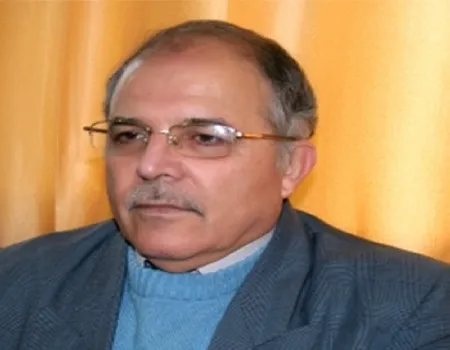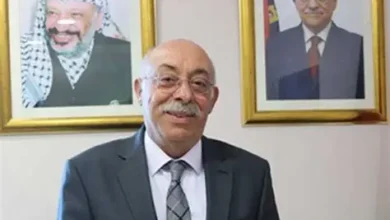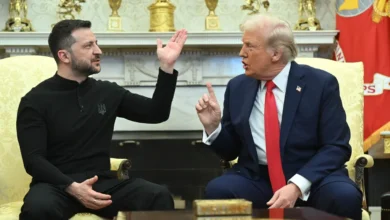Israeli strategists: assessing the flood of Al-Aqsa and the future By Dr. Walid Abdel Hay.
By Dr. Walid Abdel Hay

Israeli strategists: assessing the flood of Al-Aqsa and the future
By Dr. Walid Abdel Hay.
April 27, 2024
Experts in Israel have an undeniable role in the preparation and decision-making of strategic politics in particular, and therefore, future Israeli projects can be felt by following the literature of these experts, especially since most of them working in Israeli studies centers were senior officers in the security services, the army, political or diplomatic departments or in universities, they combine scientific experience and field experience, and the freedom of thought is available to them enough to put forward opinions contrary to what is adopted by the authority, as they Under their relationships and status, they look at the secrets of things and are often closed room sitters.
Based on the above, I followed the report prepared by a team of researchers at the Israeli National Security Institute of specialists in various fields and its topic on the day after the battle of the Al-Aqsa flood. I will present a summary of the report without any comment, and then I will try to show my most essential conclusions from the report:
Report: The report examines the following:
First, what has Israel achieved so far in its battle after more than half a year: the hostages have not been released/ Hamas has not been defeated, the hoped-for defeat/ the decline of the tendency to invade Rafah, especially since the invasion will not lead to better results, and this decline in the war can lead to fatigue accompanied by frustration and disappointment, but this situation involves opportunities that can be explored in how to exploit.
The Israeli outlook is based on the “long-term” vision of the Middle East. This vision involves the necessity of obtaining concessions to Israel in parallel with what it endured in this war, with the need to warn the Israeli leadership that it must plan for long-term strategic gains rather than “short-term” tactical gains. The experts’ assessment is a warning that Israel is currently facing one of its most difficult periods, both in terms of its international standing and its domestic situation. It isn’t easy to imagine an improvement in this reality without making practical decisions in response to its challenges…
Second: The conditions on the ground of the battle: The report finds that Israel is facing:
A- Israel’s slide into a long war of attrition, which makes the possibility of returning the hostages recede, and the possibility of replacing Hamas in Gaza recedes, but this authority – that is, the Hamas authority – has future alternatives on the one hand. Each alternative has several challenges, such as the following:
1- A military government in Gaza run by Israel: This has many political, economic, and military implications.
2- Transferring responsibility for the Gaza Strip to Egypt (but Egypt refuses to do so completely)
3- Delegating authority to tribes and clans, but failure in such a project will lead to chaos
4- Establishing a government with Arab and international participation, but the absence of the Palestinian role creates problems for this solution
5- The establishment of an interim Palestinian government separate from the PA in Ramallah.
6- The restoration of the Palestinian Authority after its renewal to control Gaza with Arab and international assistance.
The best solution among these alternatives is solution No. 6, taking into account the following:
– Ensuring Arab and international support
– Accelerating the entry of humanitarian aid, provided that Fatah supervises this with Arab and international assistance
– A ceasefire with Hezbollah provided that Radwan’s forces withdraw from the border and ensure the activation of international monitoring to prevent infiltrators and anti-armor missiles from reaching Hezbollah in this area.
The announcement of a ceasefire in Gaza does not mean that Israel will refrain from continuing planning to work to dismantle and disarm Hamas.
This would require the security coordination authority to assume authority in Gaza while Israel would retain security management in the Strip.
Third, a deal to release the hostages must be accepted quickly, even if the conclusion of such a deal requires the cessation of the war. Israel should act on this aspect, as it has the right at a later stage to withdraw from any conditions needed for the deal (for example, withdrawal after the deal returns to war). On the other hand, Israel must give priority to civilian hostages and separate them from military personnel. As for the ordinary Palestinian detainees who can be released in exchange, Israel has the right to return them to detention if it senses any danger from them. Their release should be linked to regional concessions such as expanding the circle of Arab-Israeli normalization, which increases the sense of security among Israelis.
Fourth: To avoid a humanitarian catastrophe in the Gaza Strip, humanitarian aid must be organized and integrated with the process of establishing an alternative civilian entity to Hamas while preventing aid from falling into the hands of this organization. It is better that the aid comes to the port of Ashdod and then is transported to Gaza because the rehabilitation of the Gaza port will give Hamas an advantage and a scene of sovereignty.
Fifth: The recommendation to stop the current campaign and move to a different mode of operation does not prevent the resumption of the war in Rafah, provided that Israel adopts a different course of action and timing that serves the desired strategic objective.
1- Arranging the Egyptian border with Gaza and in cooperation with America (and informing Israel of every step) to ensure that there is no smuggling, especially weapons.
2- If Israel does not attack Rafah, its demands must remain: the surrender of Sinwar and Deif and the surrender of the Qassam Brigades, and in case of refusal, the assassination of leaders, the destruction of civilian and military infrastructure, and the closure of the Philadelphia corridor altogether.
3- The above objectives can be achieved in coordination with Egypt and the United States through ground and air strikes and special operations.
4- These operations are carried out after the release of the hostages.
Sixth, strengthening Israel’s resilience by bridging Israel’s internal rift will enable viability and rapid recovery from the collective shock toward prosperity and growth, which requires the recovery of hostages, ensuring the repatriation of displaced persons from settlements north and south, and ensuring the restoration of cohesion between government and society.
Seventh: The formation and cohesion of the resistance front, consisting of Iran and Palestinian resistance organizations, has eroded Israeli deterrence and seriously increased the sense of self-confidence among Israel’s enemies in this axis, so cooperation with America must be made and the Lebanese government must push for arrangements that enhance the role of international forces and distance Hezbollah elements from the south.
As for Iran, it is necessary to increase sanctions on it, increase the number of observers from the Nuclear Energy Agency on its nuclear projects, link the easing of sanctions to regressive steps by Iran in its nuclear project, and not rule out military strikes against Iran’s nuclear projects.
Eighth: Work to maintain the strength and development of US-Israeli relations, especially since American support in this war is parallel to support for Israel during the 1973 war, and there will be no significant crisis between America and Israel until after the presidential elections in November 2024, and there are latent feelings Trump has against Netanyahu, and Biden’s Democratic Party is increasing in negative attitude towards Israel, which can increase between the two parties in the long term, so Israel must work to restore The United States to the Middle East and to be more cautious in its policy speeches towards the United States.
What do we conclude from this Israeli report:
1- The battle with the resistance has not and will not end in the foreseeable future, as it may know a temporary calm and then soon explode.
2- The issue of hostages – which is evident from the report – is a significant pressure factor on the Israeli position, which requires the resistance to adopt a “blackmail strategy” to obtain the best results. Perhaps the announcement from time to time about the killing of some hostages “due to Israeli bombing” is an essential factor in fueling the home front and embarrassing the Zionist decision-maker.
3- The strategic bet from Israel on the role of the Security Coordination Authority is enormous, which confirms that the hidden relations between the two parties are more profound than they appear on the surface. The resistance must stifle any proposed role of the Security Coordination Authority.
4- The essence of the Israeli negotiation is based on non-commitment
5- Israel trusts the orientations of the Egyptian authority in terms of its hostility to the Palestinian liberation movement, religious or secular, and that Egypt does not want to return to the field of Arab-Israeli conflict under any circumstances.
6- The resistance should seek to expand the negotiating parties by involving other countries that have relations with everyone. We believe that Turkey can be much better than Qatar because the degree of independence of the Turkish decision is much higher than the degree of autonomy of the Qatari or Egyptian decision (despite the controversial Erdogan approach), or Spain or Ireland can participate or revive the role of the Quartet, either continuing to negotiate with the current Quartet is a repetition of “orphans at the tables of harmony.”
7—Israel believes that its security can remain in danger with the continued existence of the “axis of resistance.” Therefore, it sees the need for the United States to tighten its more profound presence in the Middle East as the most critical pressure lever to paralyze the Iranian role, restore Israel’s position in American policy priorities, and strengthen its functional role in American strategy.
Translated from Arabic by Ibrahim Ebeid.





